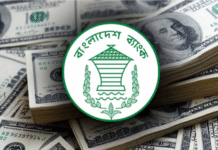
Last update on: Thu Jun 12, 2025 12:09 AM

Sales of cattle, as reflected in the number of animals sacrificed during this Eid-ul-Azha, declined this year amid an economic slowdown and political uncertainty in the country, said dairy producers and stakeholders yesterday.
During this Eid-ul-Azha, over 91 lakh animals were sacrificed, down 12.5 percent year-on-year, according to the Department of Livestock Services (DLS).
The number of animals sacrificed this year was the lowest in the last four years.
Mohammad Shah Emran, general secretary of the Bangladesh Dairy Farmers Association, said data on the number of animals sacrificed gives a picture of cattle sales during the festival season, which accounts for roughly 40 percent of animals slaughtered annually.
“This year, sales were low because of the overall slowdown in the economy and political situation. Demand for big bulls was lower this year than the previous year,” he said.
Md Abu Sufian, director general of the DLS, said there was a sufficient number of animals. But the number of goats and sheep sacrificed was around 10 lakh less than that of last year, he said.
A decline in people’s purchasing power due to persistent inflation is a reason behind the drop in the number of sacrifices this year, added Sufian.
Data is still being collected from across the country, and once all of it is available, it will provide a better understanding of the other factors behind the drop in animal sacrifices, he said.
Inflation in Bangladesh eased slightly to 9.05 percent in May from 9.17 percent in the previous month, according to the Bangladesh Bureau of Statistics.
Food inflation dropped to 8.59 percent from 8.63 percent in April, while non-food inflation went down to 9.42 percent from 9.62 percent.
Despite the decline, inflation has remained above 9 percent for 27 consecutive months, continuing to strain household budgets.
High inflation has eroded people’s financial capacity, which has led to reduced purchasing power and, consequently, fewer animal sacrifices, said Jahangir Alam Khan, a renowned agricultural economist.
Moreover, those who could afford to sacrifice more than one animal opted to do otherwise in order to save up to tackle future uncertainties, he said.
Since last August, the country has been lacking political stability. Quite a few politicians and politically affiliated persons who usually sacrifice a lot of animals are either abroad or in hiding following the political changeover, he said.
This has also contributed to the decline in animal sacrifices.
33.10 LAKH ANIMALS REMAIN UNSOLD
Approximately 33.10 lakh animals remained unsold this year due to the supply being higher than demand, according to data from the Ministry of Fisheries and Livestock.
These animals are expected to be sold centring various religious rituals and ceremonies throughout the rest of the year, the ministry said in a press release.
SYLHET RECORDS LOWEST SACRIFICES
The lowest number of animals sacrificed this year was in the Sylhet division, totalling 3.19 lakh, according to data from the DLS.
This was followed by the Mymensingh division, where 3.83 lakh animals were sacrificed.
On the other hand, the highest number of sacrifices took place in the Rajshahi division, with 23.24 lakh animals, while the Dhaka division saw 21.85 lakh sacrifices.
Last year, the highest number of animals were sacrificed in the Dhaka division, while the lowest was in the Mymensingh division.









